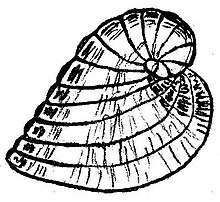Soritoidea
The Soritoidea are a group of miliolid benthic foraminifera with porcellaneous tests. They take on a variety of growth forms but typically have many chambers. Some soritids can grow over a centimeter across, huge for protists. All Soritoidea keep algal endosymbionts, which may be what allows them to achieve such large sizes. Some species have red algal symbionts, some have green algal symbionts, and others dinoflagellate symbionts. These larger symbiont-bearing foraminifera are typically found in the oligotrophic waters of the tropics.
| Soritoidea | |
|---|---|
 | |
| Illustration of Peneroplis planatus | |
| Scientific classification | |
| Domain: | Eukaryota |
| (unranked): | SAR |
| (unranked): | |
| Superphylum: | |
| Phylum: | |
| Class: | |
| Order: | |
| Superfamily: | Soritoidea Ehrenberg 1839 |
| Families | |
| |
References
- "Soritoidea". WoRMS. World Register of Marine Species. Retrieved 2018-12-04.
- Gudmundsson, G. (1994). "Phylogeny, ontogeny, and systematics of Recent Soritacea Ehrenberg 1839 (Foraminiferida)". Micropaleontology. 40 (2): 101–155. doi:10.2307/1485772. JSTOR 1485772.
This article is issued from
Wikipedia.
The text is licensed under Creative
Commons - Attribution - Sharealike.
Additional terms may apply for the media files.